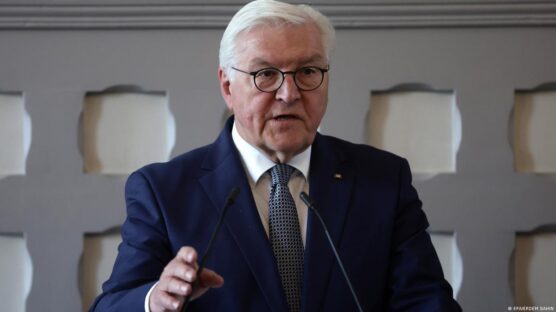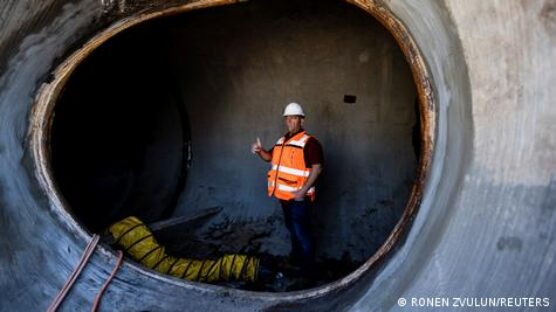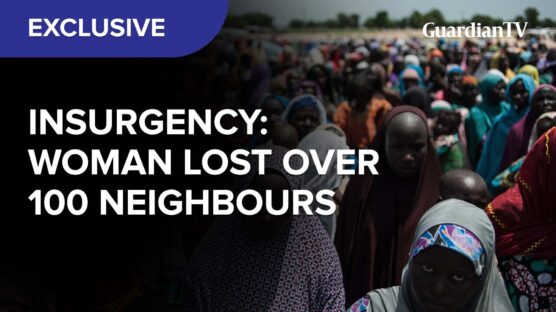Afghan Hazaras live in fear under Taliban rule
By AFP
09 October 2021 |
8:50 am
A black and white Taliban flag flies over the blown-up statue of a revered Hazara chief at the entrance to Bamiyan in central Afghanistan. Since the radical Islamists swept to power seven weeks ago, they have repeatedly promised a more moderate, inclusive brand of rule than during their last stint, when minorities were brutally persecuted. But members of the Hazara community here don't believe them.
In this article
Related
1 day ago
Related
2 days ago
A book by Frank-Walter Steinmeier titled 'We' searches for diversity in the face of division, though it's a difficult balancing act for the head of state.
1 day ago
The central Mexican city of Celaya has become the scene of a brutal turf war between rival drug cartels. These criminal groups have taken advantage of its strategic position at the crossroads for transporting drugs into the United States. Kidnappings, shootouts with police and drive-by killings now occur on an almost daily basis in broad daylight. Nearly 500 people were killed in Celaya last year. The city's police officers (pictured) risk their lives every day and are forced to travel in armoured vehicles. Our France 2 colleagues report, with FRANCE 24's Lauren Bain.
1 day ago
German teenagers and young adults find themselves increasingly unsatisfied and likely to vote for the far right, according to a survey. Fears about prosperity are highlighted as a possible cause.
1 day ago
We look at the US papers, who react to Ukraine being granted a $61 billion aid package. Also, five migrants die attempting to cross the Channel, just hours after the controversial Rwanda asylum bill is passed by the UK parliament.
1 day ago
Israel's economy suffered a major contraction in the final quarter of 2023, following the terrorist attacks. Its economy shrank by 5.2% compared with the previous quarter. Much was related to the labor force disruption which resulted when around 300,000 reservists were called up to the country's armed forces.
2 hours ago
Amnesty International is accusing Israel of a flagrant disregard for international law during its offensive in Gaza. The organisation's annual report says the situation is being compounded by the failures of Israel's allies to stop the indescribable civilian bloodshed being seen in the Palestinian enclave.
Latest
2 hours ago
Private sector players are urging the Nigerian government to suspend the increase in electricity tariff for band A customers, citing the recent appreciation of the naira, a part of the determining factor for the tariff. Segun Ajayi-Kadir, Director General of the Manufacturers Association of Nigeria, joins CNBC Africa for this and more.
2 hours ago
The president of the Confederation of African Football (CAF) Patrice Motsepe discussed his ambitions for African football and his tenure as CAF president.
1 day ago
Find these stories and much more when you grab a copy of The Guardian on Thursday.
1 day ago
Tunde Onakoya, the Nigerian Chess expert who smashed the previous Guinness World Record for the longest chess marathon has returned to Nigeria. The founder of Chess In Slums Africa broke a new record of 60 hours of playtime in New York’s Times Square last Saturday, which is still receiving confirmation from GWR.
1 day ago
The German government revised its economic growth forecast for 2024 marginally from 0.2% to 0.3%, Economy Minister Robert Habeck confirmed on Wednesday afternoon.
1 day ago
With the rate of insurgency in Borno State, many lives and families have been severely affected, with thousands being displaced and forced to live in internally displaced camps (IDP). A mother, who has lost neighbors, family, friends, and loved ones still in captivity, shares her heartbreaking experience of living in constant fear. She calls on the government to provide more basic amenities to help her and others in the IDP camp in Chabbol village, Borno state.
×

Get the latest news delivered straight to your inbox every day of the week. Stay informed with the Guardian’s leading coverage of Nigerian and world news, business, technology and sports.


















0 Comments
We will review and take appropriate action.